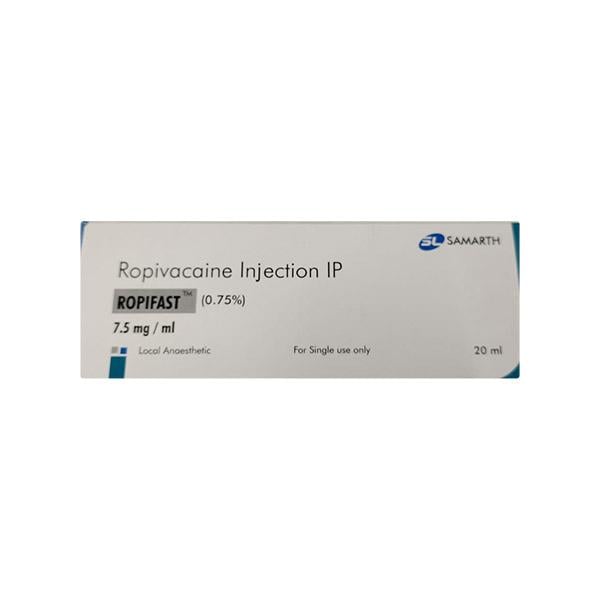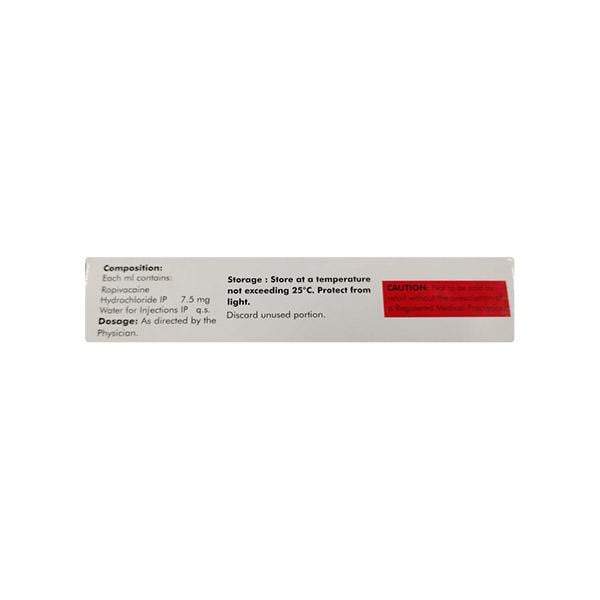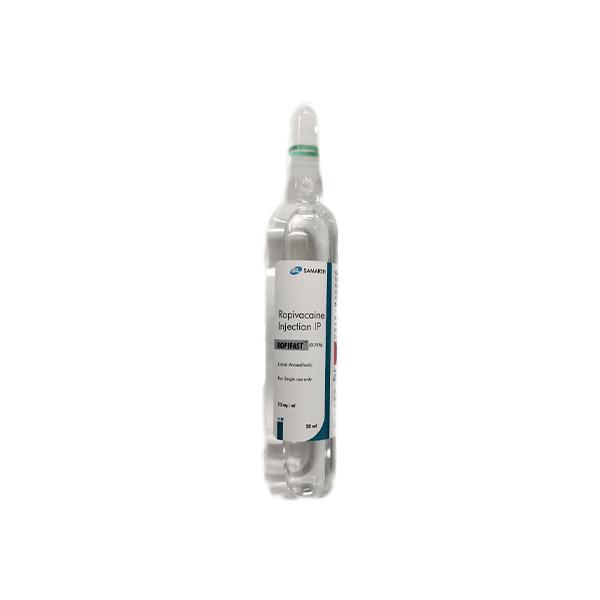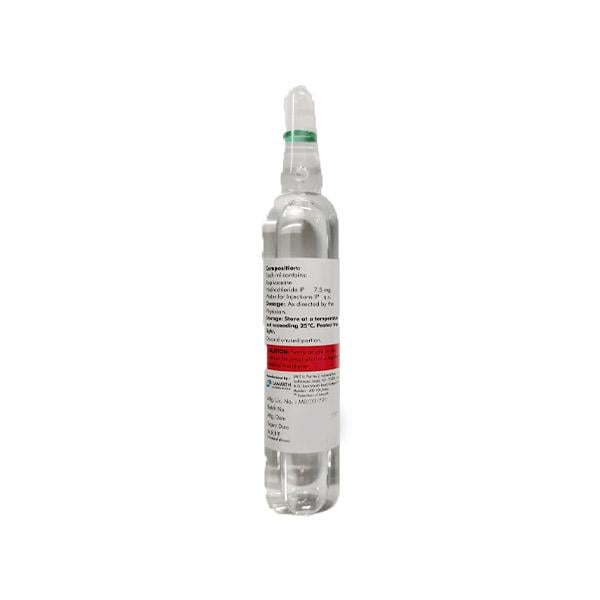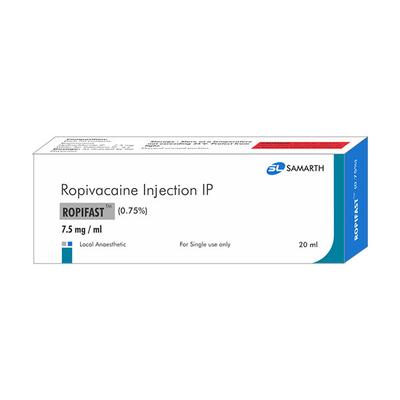

Netmeds First Membership
Quick Links
Introduction About ROPIFAST 0.75% INJECTION
ROPIFAST 0.75% INJECTION contains Ropivacaine which belongs to the group of medicines called Local Anaesthetics. It is used in adults and children above 12 years of age to numb (anaesthetise) parts of the body during surgery, including having a baby by caesarean section and to relieve pain during childbirth, after surgery or after an accident.
ROPIFAST 0.75% INJECTION is not recommended for use in patients suffering from hypovolemia (decrease in blood volume). Consult your doctor before receiving it.
ROPIFAST 0.75% INJECTION should be used with caution in patients suffering from lung, heart diseases, severe liver or kidney disease. Consult your doctor before receiving it.
ROPIFAST 0.75% INJECTION should be used during pregnancy only if clearly necessary and inform your doctor if you are breast feeding as it is not known whether this medicine passes into breast milk.
ROPIFAST 0.75% INJECTION is not recommended for use in children below 12 years of age. It should be used with caution in elderly patients above 65 years of age. Consult your doctor before receiving it.
The most common side effects after receiving ROPIFAST 0.75% INJECTION are low blood pressure causing dizziness or light-headedness and nausea. Contact your doctor if any of the symptoms worsen.
Uses Of ROPIFAST 0.75% INJECTION
- To numb (anaesthetise) parts of the body during surgery
- To relieve pain during childbirth, after surgery or after an accident
How ROPIFAST 0.75% INJECTION Works
ROPIFAST 0.75% INJECTION works by stopping the nerves from being able to pass pain messages to the brain. Thus ROPIFAST 0.75% INJECTION will stop you feeling pain, heat or cold in where it is used however you may still have other feelings like pressure or touch.
How to use ROPIFAST 0.75% INJECTION
ROPIFAST 0.75% INJECTION will be given to you only by a doctor as an injection or as an infusion into the region or near to the body part that needs to be numbed or as an epidural injection (into the area around the spinal cord). Your doctor will decide the exact dose and duration of management depending upon the type of pain relief you need, age, body weight and condition.
Side Effects Of ROPIFAST 0.75% INJECTION
Common
- low blood pressure causing dizziness, light-headedness
- nausea, vomiting
- difficulty in passing urine
- high blood pressure
- back pain
- fever and chills
- slow or fast heart beat (bradycardia, tachycardia)
- pins and needles
- headache
- muscle stiffness
Uncommon
- anxiety
- fits
- numbness of the lips and around the mouth, tongue
- hearing problems
- problems with your sight (vision), speech (dysarthria)
- muscular twitching and trembling
- fainting
- difficulty breathing
- low body temperature
Rare
- heart attack (cardiac arrest)
- arrhythmias (uneven heartbeat)
- damaged nerves
Stop receiving ROPIFAST 0.75% INJECTION and consult your doctor immediately if you experience any of the following side effects:
- serious allergic reactions (such as anaphylaxis) include sudden onset of rash, itching or hives, swelling of the face, lips, tongue or other parts of the body causing shortness of breath, wheezing or difficulty breathing
- signs and symptoms of methemoglobinemia include pale, grey or blue-coloured skin, headache, rapid heart rate, shortness of breath, light-headedness and fatigue
How To Manage Side Effects
Headache:
Rest and relax. Drink plenty of fluids such as water or ORS (Oral Rehydrating Solution) and apply a pain-relieving balm on the head if necessary. Contact your doctor if your headache did not improve.
Dizziness:
Try to rest and relax. Get enough sleep. Avoid driving or operating any machines while you are feeling dizzy. Contact your doctor if your dizziness did not improve.
Nausea and vomiting:
Receive the medicine, with or just after a meal. Stick to simple meals. Avoid eating oily or spicy food. Contact your doctor if your nausea and vomiting did not improve.
Warning & Precautions
Pregnancy
ROPIFAST 0.75% INJECTION should be used during pregnancy only if clearly necessary. Contact your doctor before receiving it.
ROPIFAST 0.75% INJECTION is not recommended for use as an injection into the neck of the womb to relieve pain during childbirth.
Breastfeeding
If you are breastfeeding, ask your doctor for advice as it is not known whether this medicine passes into breast milk.
Driving and Using Machines
ROPIFAST 0.75% INJECTION can make you feel sleepy and affect your action-reaction speed. Do not drive or operate machines until the next day after receiving ROPIFAST 0.75% INJECTION.
Kidney
ROPIFAST 0.75% INJECTION should be used with caution in patients suffering from severe kidney diseases. Consult your doctor before receiving it.
Liver
ROPIFAST 0.75% INJECTION should be used with caution in patients suffering from advanced liver diseases. Consult your doctor before receiving it.
Allergy
Do not receive ROPIFAST 0.75% INJECTION if you are allergic to ropivacaine or to other local anaesthetics such as lidocaine, bupivacaine or any of the other ingredients of this ROPIFAST 0.75% INJECTION.
Lungs
ROPIFAST 0.75% INJECTION should be used with caution in patients suffering from lung diseases. Consult your doctor before receiving it.
Heart Disease
ROPIFAST 0.75% INJECTION should be used with caution in patients suffering from heart disease such as partial or complete heart conduction block. Consult your doctor before receiving it.
Others
ROPIFAST 0.75% INJECTION is not recommended for use if you have:
- hypovolemia (decrease in blood volume)
Before receiving ROPIFAST 0.75% INJECTION inform your doctor if you have:
- acute porphyria (rare blood disorder) or family history of porphyria
- poor general health due to age or other reasons
- glucose-6phosphate dehydrogenase deficiency (hereditary disorder that affects red blood cells)
- congenital or idiopathic methemoglobinemia (condition affects red blood cells)
Use in paediatrics:
ROPIFAST 0.75% INJECTION is not recommended for use in children below 12 years of age. Consult your doctor before receiving it.
Use in geriatrics:
ROPIFAST 0.75% INJECTION should be used with caution in elderly patients above 65 years of age. Consult your doctor before receiving it.
Interactions
A. Drug-Drug interactions:
Before receiving ROPIFAST 0.75% INJECTION, inform your doctor if you are taking any of the following medicine:
- morphine, codeine (medicines used to manage severe pain)
- local anaesthetics such as bupivacaine, articaine, benzocaine, prilocaine, procaine, mepivacaine, tetracaine (medicines which induce numbness in a specific part of the body)
- mexiletine, amiodarone, lidocaine (medicines used for management of irregular heartbeat)
- fluvoxamine, imipramine (medicine used for management of depression)
- ketoconazole (used for management fungal infections)
- nitric oxide, nitro-glycerine, nitroprusside (medicines used to manage high blood pressure and heart diseases)
- nitrous oxide (a medicine used in general anaesthesia or to manage severe pain)
- phenobarbital, phenytoin, sodium valproate (medicines used to manage fits)
- acetaminophen (a medicine used to manage fever and pain)
- metoclopramide (used for management nausea and vomiting)
- sulfasalazine (used for management inflammatory bowel disease)
- antineoplastic agents Ex. cyclophosphamide, flutamide, hydroxyurea, ifosfamide, rasburicase (medicines used to manage cancer)
- chloroquine, primaquine, quinine (medicines used to manage malaria)
- enoxacin, sulphonamides like silver sulphadiazine (used to manage bacterial infections)
- dapsone (used to manage leprosy)
- nitrofurantoin (used to manage urinary tract infections)
- para-amino salicylic acid (used to manage tuberculosis)
- theophylline (used to manage asthma)
Overdosage:
ROPIFAST 0.75% INJECTION will be administered to you only by a doctor in a hospital and so it is unlikely to receive an overdose. However, consult your doctor or nurse if you experience any unusual symptoms such as dizziness or light headedness, numbness of lips, tongue, around mouth, hearing problems, visual problems, tingling sensations, muscle stiffness, muscle twitching, speech problems, tremors, trembling, fits, loss of consciousness low blood pressure, slow or irregular heartbeat. These symptoms might worsen to cardiac arrest, breathing arrest or severe fits.
Synopsis
| Drug | : | Ropivacaine |
| Pharmacological Category | : | Local Anaesthetics |
| Therapeutic Indication | : | To numb part of the body during surgery and to relieve pain |
| Dosage Forms | : | Injection |
More Information
- Keep ROPIFAST 0.75% INJECTION out of reach of children
- Store ROPIFAST 0.75% INJECTION below 30°C
- Do not freeze
FAQs About ROPIFAST 0.75% INJECTION
What is ROPIFAST 0.75% INJECTION used for?
ROPIFAST 0.75% INJECTION is used in adults and children above 12 years of age to numb (anaesthetise) parts of the body during surgery, including having a baby by caesarean section and to relieve pain during childbirth, after surgery or after an accident. Contact your doctor before receiving it.
What does ROPIFAST 0.75% INJECTION do to the brain?
ROPIFAST 0.75% INJECTION works by stopping the nerves from being able to pass pain messages to the brain. Thus ROPIFAST 0.75% INJECTION will stop you feeling pain, heat or cold in where it is used however you may still have other feelings like pressure or touch.
What if I receive too much of ROPIFAST 0.75% INJECTION?
ROPIFAST 0.75% INJECTION will be administered to you only by a doctor in a hospital and so it is unlikely to receive an overdose. However, consult your doctor or nurse if you experience any unusual symptoms such as dizziness or light headedness, numbness of lips, tongue, around mouth, hearing problems, visual problems, tingling sensations, muscle stiffness, muscle twitching, speech problems, tremors, trembling, fits, loss of consciousness low blood pressure, slow or irregular heartbeat. These symptoms might worsen to cardiac arrest, breathing arrest or severe fits.
Who should not use ROPIFAST 0.75% INJECTION?
ROPIFAST 0.75% INJECTION is not recommended for use in patients with hypovolemia (low blood volume), allergic history to ropivacaine or to other local anaesthetics such as lidocaine, bupivacaine and in children under 12 years of age. Contact your doctor before receiving it.
Does ROPIFAST 0.75% INJECTION make you sleepy?
ROPIFAST 0.75% INJECTION can make you feel sleepy. Try to rest and relax. Get enough sleep. Do not drive or operate machines until the next day after receiving ROPIFAST 0.75% INJECTION. Contact your doctor if your sleepiness did not improve.
References
1. KD Tripathi. Local Anaesthetics. Essentials of Medical Pharmacology, 7th edition. 2013. page 367.
2. Ashley M. George, Mark Liu. Ropivacaine. NIH National Library of Medicine, National Center for Biotechnology Information. Statpearls. August 2022. [Accessed on 6th September 2022] https://www.ncbi.nlm.nih.gov/books/NBK532924/#article-43447.s3
3. Kuthiala G, Chaudhary G. Ropivacaine: A review of its pharmacology and clinical use. NIH National Library of Medicine, National Center for Biotechnology Information. PubMed Central. March-April 2011. [Accessed on 6th September 2022] https://www.ncbi.nlm.nih.gov/pmc/articles/PMC3106379/
4. Aspen Pharma Trading Limited. Health Products Regulatory Authority. [Revised in May 2022] [Accessed on 6th September 2022] https://www.hpra.ie/img/uploaded/swedocuments/6ed15cd6-edf0-4834-bf56-a673f6c06497.pdf
5. Aspen Pharma Trading Limited. Electronic Medicines Compendium. [Revised in July 2022] [Accessed on 6th September 2022] https://www.medicines.org.uk/emc/files/pil.1497.pdf
6. Sintetica Limited. Electronic Medicines Compendium. [Revised in February 2019] [Accessed on 6th September 2022] https://www.medicines.org.uk/emc/product/9686/pil#gref, https://www.medicines.org.uk/emc/files/pil.9686.pdf
7. Pharmacy Retailing (NZ) Limited. New Zealand Medicines and Medical devices Safety Authority. [Revised in September 2022] [Accessed on 6th September 2022] https://www.medsafe.govt.nz/profs/datasheet/n/Naropininj.pdf
8. Fresenius Kabi USA, LLC. U.S. Food & Drug Administration. [Revised in November 2018] [Accessed on 6th September 2022] https://www.accessdata.fda.gov/drugsatfda_docs/label/2018/020533s035lbl.pdf
Useful Diagnostic Tests
- Electrocardiogram (ECG)
- Kidney function test










